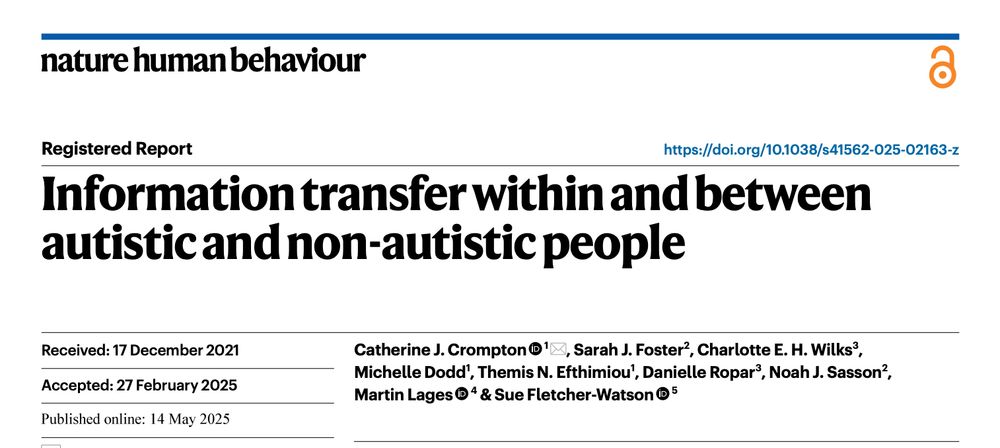
PhD student @UTDallas
Researching stigma, interactions, communication, affect, and the DEP
AIR-P fellow & INSAR ARC member

Our new paper shows how stigma is shaped by race, gender, and sexuality, creating unique challenges for Black autistic adults, women, and LGBTQ+ autistic people.
www.liebertpub.com/d...
1/2

Our new paper shows how stigma is shaped by race, gender, and sexuality, creating unique challenges for Black autistic adults, women, and LGBTQ+ autistic people.
www.liebertpub.com/d...
1/2
@sarah-foster.bsky.social et al examined verbal collaboration during a group tower-building task among autistic and non-autistic adults
NEW FREE to Aug 28
www.liebertpub.com/doi/10.1089/...

@sarah-foster.bsky.social et al examined verbal collaboration during a group tower-building task among autistic and non-autistic adults
NEW FREE to Aug 28
www.liebertpub.com/doi/10.1089/...
et al. examined verbal collaboration during a group tower-building task among autistic and non-autistic adults (1/)
NEW FREE to Aug 28
www.liebertpub.com/doi/10.1089/...

et al. examined verbal collaboration during a group tower-building task among autistic and non-autistic adults (1/)
NEW FREE to Aug 28
www.liebertpub.com/doi/10.1089/...


We examined verbal collaboration among autistic and non-autistic adults in same- and mixed-neurotype groups during a shared task.
We examined verbal collaboration among autistic and non-autistic adults in same- and mixed-neurotype groups during a shared task.
news.utdallas.edu/health-medic... #autism #neurodiversity


Information transfer within and between autistic and non-autistic people is out today in @nathumbehav.nature.com
nature.com/articles/s41...
THREAD! 🧵⬇️

Information transfer within and between autistic and non-autistic people is out today in @nathumbehav.nature.com
nature.com/articles/s41...
THREAD! 🧵⬇️
During a building activity, both the non-autistic groups & the mixed groups had instances where someone didn’t participate, or someone built a separate tower, or they started over after already beginning.
None of these things happened in the groups of all autistic participants

During a building activity, both the non-autistic groups & the mixed groups had instances where someone didn’t participate, or someone built a separate tower, or they started over after already beginning.
None of these things happened in the groups of all autistic participants


journals.sagepub.com/doi/10.1177/...

journals.sagepub.com/doi/10.1177/...
RFK Jr is an astoundingly cruel man
"I had only one advantage: I’m a historian. One of the true gifts of studying the humanities is not the content we learn in school, but that we develop the skills to learn what we need to know when life takes unexpected turns. So like a proper nerd, I made a reading list."

RFK Jr is an astoundingly cruel man
www.liebertpub.com/doi/10.1089/...

www.liebertpub.com/doi/10.1089/...
To start with, here’s the feed link:
bsky.app/profile/did:...
To start with, here’s the feed link:
bsky.app/profile/did:...

